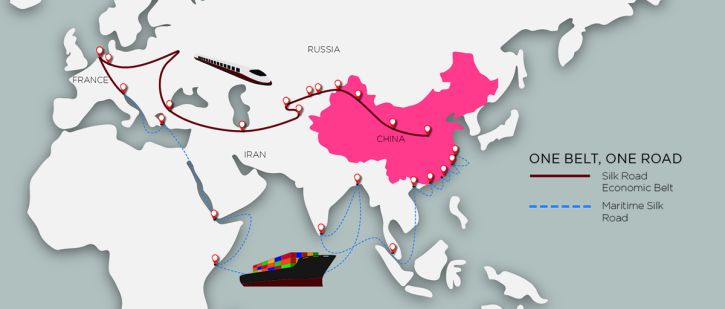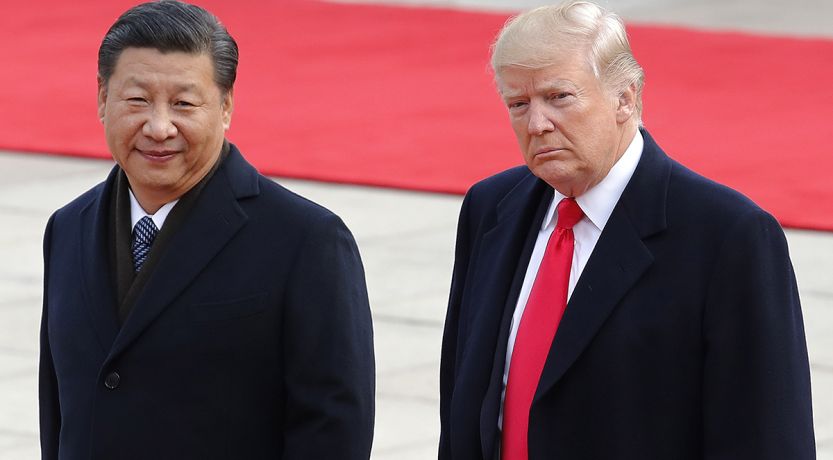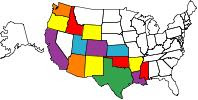For “Scripture Sunday”:
World InSight: China’s Dream
LISTEN TO THIS ARTICLE
“With an increasingly ambitious foreign policy and a leader newly infused with unprecedented power, China aims to restore its historical dominance in Asia and beyond. The global implications of this vision are immense.
As recently as 2005, China’s economy was less than half the size of the U.S., but it is on pace to be 40 percent larger than America’s by the end of Mr. Xi’s second term. The shift in power and confidence is noticeable.
The new Silk Road
Forming the backbone of China’s audacious economic and political agenda is the titanic venture Mr. Xi announced in 2013, introduced as the “One Belt, One Road Initiative” (OBOR). Expected to become the greatest public works project in history, this unparalleled geopolitical and geo-economic game changer—still in its early stages—aims to link countries along the ancient Silk Road trade route with high-speed rail system that will cut the time required to move freight from Beijing to Rotterdam from a month to two days!

At a cost exceeding $1.4 trillion (the equivalent of 12 Marshall Plans), it will incorporate more than a thousand megaprojects spanning three continents and connecting 65 percent of the world’s population to strategically draw countries and companies more into China’s orbit while providing arteries for Chinese goods flowing into Europe.
The “One Road,” or maritime Silk Road, extends from coastal southeast China, touching nearly every country bordering the Indian Ocean, rounding the Horn of Africa, to the Mediterranean. To penetrate the struggling but affluent European market—China’s largest trading partner—Beijing is even financing the upgrade of the Greek port of Piraeus.
Similarly, the “One Belt” will be a colossal network of railroads, pipelines, highways and land bridges forming high-speed economic corridors to commercialize all of Central Asia—Pakistan, Russia, Iran, Turkey, Indochina and India.

Mr. Xi has thrown out the “lay low” doctrine of Deng Xiaoping: “hide our capabilities and bide our time; never try to take the lead.” Instead, he has hailed the start of a new era—China’s Dream—with recovery from its “century of humiliation” at the hands of colonial powers like Japan, Britain and France. In a recent address to the Communist Party, He declared that the country “stood up” under Mao Zedong and became rich under Deng, but under Xi it has grown powerful and now seeks to shape the global system.
Exalting the new “emperor”
“Never before has a nation risen so far, so fast, on so many dimensions, as China has over the past generation,” according to Destined for War author Graham Allison. “The same could be said of Mr. Xi, who went from a politically exiled peasant … to ‘Chairman of Everything’” (Wall Street Journal, Oct. 16, 2017).
China’s recent 19th Party Congress—normally an opaque, twice-a-decade reshuffling of uncharismatic technocrats—emphatically ended an era of collective leadership by exalting Xi Jinping, who was already the most powerful Chinese leader in decades, to a second five-year term without an obvious successor, effectively crowning him China’s 21st-century emperor.
Now described as the party’s lingxiu—an honorific title meaning supreme leader that has not been used since the Mao era—Mr. Xi was elevated to the Chinese Communist Party pantheon with “Xi Jinping Thought” officially embedded into the party charter alongside Mao’s, making him politically untouchable.
Princeling, peasant, president
Because of his illustrious roots—born in Beijing in 1953 to a trusted revolutionary colleague and vice premier under Mao—Mr. Xi is seen as a princeling, a child of elite senior officials who has risen through the ranks.
However, shortly after his ninth birthday his father was purged prior to the Cultural Revolution and imprisoned, and his mother was assigned to hard labor on a farm. The younger Xi was sent to the remote countryside for “reeducation” through hard labor for seven years where he was forced to denounce his father while shoveling dung and living in a flea-infested cave. His older half-sister hanged herself because of the abuse, but the exceptionally ambitious young Xi, according to a longtime friend, “chose to survive by becoming redder than red” and clawing his way back to prominence (Evan Osnos, New Yorker, April 6, 2015).
Exhibiting incredible persistence, Mr. Xi—today the leader of a Communist Party with 89 million members—was actually rejected time after time when he sought to join the party. Later, as China grew richer, the unassuming Tsinghua University chemical engineering graduate grew adept at keeping his head down and avoiding ostentatious displays of wealth as he climbed the provincial political ladder, but he was always credited with overseeing spectacular growth.
After election to the presidency in 2013, he was expected to be a bland figurehead and technocratic spokesman of the collective leadership, but Mr. Xi moved with stunning skill, speed and determination, wielding a highly visible anticorruption campaign to purge dozens of powerful rivals and consolidate power.
As former Australian prime minister and noted China expert Kevin Rudd puts it, Xi has a “deep sense of national mission, a clear political vision for the country,” and is “very much a man in a hurry” (as quoted by Graham Allison, Destined for War, 2017, p. 118).
Winning without a fight
With Mr. Xi tasking his military to be able to “fight and win” any military encounter, focus has been on the buildup of conventional forces and the transformation of reefs, rocks and sandbars in the South China Sea into forward-based military installations. America’s top military officer, General Joseph Dunford, recently sounded an alarm, telling the U.S. Congress that China is likely to be the “greatest threat” of any foe to the U.S. within the decade since “China is focused on limiting our ability to project power and weakening our alliances in the Pacific.”
Ancient Chinese strategist Sun Tzu’s maxim “subdue the enemy without fighting” reveals China’s primary direction today. As former U.S. Secretary of State Henry Kissinger explains in On China,victory for Sun Tzu was “not simply the triumph of armed forces,” but “the achievement of the ultimate political objectives” that a military clash would be intended to secure. “Far better than challenging the enemy on the field of battle is … maneuvering him into an unfavorable position from which escape is impossible” (2011, p. 28).
Excerpts from: https://lifehopeandtruth.com/discern/jan-feb-2018-discern/chinas-dream/
_________
Dealing With Doubt
“Spiritual doubt is common, even among those who want to believe. But the Bible shows us how to deal with doubts and grow in faith.

Our modern world seems designed to foster doubts about God and the Bible. Evolution discounts the need for a Creator. Scholars question the accuracy of the Bible. Public opinion redefines the biblical standards of right and wrong. Religious leaders too often show appalling hypocrisy. Evil grows, and yet God seems to be in hiding.
And religious people struggle with doubt.
For example, a Barna study showed:
“Just over one-quarter (26%) [of American adults who self-identify as Christian] say they still experience spiritual doubt, while four in 10 (40%) say they have experienced it in the past but have worked through it. Only about one-third (35%) claim to have never experienced it at all. …
“Having come of age in a more secular and pluralist culture, Millennials (38%) currently experience about twice as much doubt as any of the other generational groups (23% Gen-Xers, 19% Boomers, 20% Elders). Men are also more likely than women to actively experience doubt (32% compared to 20% women). Those who have been through college and encountered an array of ideas, philosophies and worldviews are twice as likely to experience doubt as those who have a high school education or less (37% vs. 19%).”
But though it seems to have grown in the modern age, doubt is nothing new.
Biblical doubters
When we have doubts, we can consider ourselves in good company. Jesus said to Peter, “O you of little faith, why did you doubt?” (Matthew 14:31). Of course, Peter did have faith to step out of the boat to walk on water! But as the wind hit him, so too did doubt.
However, over the years Peter did learn not to doubt and taught others to “not be afraid,” as he wrote in 1 Peter 3:14.
Then there was the disciple, soon to be apostle, whose name has become associated with doubting. After the resurrection, doubting Thomas said, “Unless I see in His hands the print of the nails, and put my finger into the print of the nails, and put my hand into His side, I will not believe” (John 20:25).
However, when the resurrected Christ did appear and speak to him, Thomas responded in verse 28: “My Lord and my God!”
Then Jesus pronounced a blessing on us today who face even more of a challenge. Jesus said, “Thomas, because you have seen Me, you have believed. Blessed are those who have not seen and yet have believed” (John 20:29).
But how do we claim that blessing? How can we deal with doubts and strengthen our beliefs?
How to deal with doubts
God is the Creator, and the Bible is His message to us today. He cares about us and is working out a plan that provides opportunities for every human who is alive or who has ever lived. But how can we prove these things and build the faith to deal with the overwhelming challenges and storms of life that can cause us to doubt? How can questioning our faith help it to grow?
Here are some biblical principles for dealing with doubts…….
Continued at: https://lifehopeandtruth.com/change/faith/dealing-with-doubt/
_________
5 Reasons NOT to Celebrate Valentine's Day
“Here’s five tongue-in-cheek reasons not to celebrate Valentine’s Day. But can you find another?
Transcript
[Steve Myers] “Here’s a little tongue-in-cheek discussion on 5 reasons not to celebrate Valentine’s Day.
Number one: Flowers make you sneeze and they don’t last very long.
Number two: Pink does not make you look thinner.
In fact, number three: Pink’s a girly color that makes men feel wimpy.
Number four: Chocolate makes you fat.
Number five: Valentine’s Day is just commercialism by the greeting card companies to make millions of dollars.
Are those any reasons that you shouldn’t celebrate Valentine’s Day? There is a more important reason, but it comes back to realizing what is life all about. What is romance after all because Valentine’s Day is supposed to focus on romance? And we often think of the flowers and the candy and the meals out and all those kinds of things.
But you know what? Romance is sometimes vacuuming the house. Romance is sometimes, yeah, cleaning the toilet or maybe changing a diaper or two or maybe making his favorite dessert. That’s what real romance comes down to so much of the time, real life. And sometimes we get fooled by taking one day and trying to make something huge out of it when in reality love is a daily thing. It’s something that we show every single day of our life.
Christ Himself said that whatever we want men to do to us, we should do to them. And it should be something that’s on going, not just a onetime thing.
It reminded me of a passage that’s over in Ecclesiastes in Ecclesiastes 9:9. Ecclesiastes 9:9 says, “Live joyfully with the wife whom you love all the days of your vain life, which He’s given you under the sun.” So it’s all our days not just one day.
And so you could probably come up with a longer list of reasons not to celebrate Valentine’s Day, but you know they’re not all humorous. There is another reason.
You know that many of the world’s holidays are focused and come from roots of paganism. That’s where they’re rooted. Valentine’s Day is no different, named after a Catholic saint. It’s rooted in paganism. Maybe that’s a question you could ask yourself. What does God think about Valentine’s Day?Check it out a little bit. Look at what Deuteronomy 12 has to say about it . Check it out. Do a little bit of research . You may be very surprised what you find. In fact, you’ll probably add one more big reason not to celebrate Valentine’s Day.
From: https://www.ucg.org/beyond-today/beyond-today-daily/5-reasons-not-to-celebrate-valentines-day
________
Update:
Things here have been slow and hectic all at once. No work has been done on either place, and I haven’t even had time to list items for sale this week, which will not improve my ‘bottom line’.
Each morning since Claudia arrived at the Hospice 10 miles away in Willis, I have been taking Jay to see his mother, and have taken a picture of them each day, but I don’t know how much longer she can last. She can’t eat, and she is only able to say a few words now and then.
Jay didn’t want to be on his own at this time, so he stayed here for a while. Not by invitation, he just said he might as well sleep on the couch, and it grew in to several nights from there. But yesterday, I just had to ask him go home. He eats all the time, makes a mess every time, fiddles with and moves things, and then all he wants to do is eat sweet stuff, which makes him more hyper, and tell me what to do in my own house. Because of his terrible diet he has high blood pressure, and has to have the AC on when every one else, me, wants the heat. There is no way he is going to stop eating a stick of butter or marg with his meals, so it is a case of “Let Go, and Let God”. “The Fat You Eat, Is The Fat You Wear”. It’s his overweight life and he won’t listen to his doctors, so let him ruin it, and suffer the consequences. There are a lot of people like that, and guess what….they are the ones who wonder why they got cancer or diabetes.
It was such a relief when he packed up all his stuff in my van yesterday so I could take him home, that I forgot to post this. I just sat in my recliner, which I hardly ever have time to do except for the half hour that Bible Study is on TV, and basked in the freedom of having my own home back to myself.
I had cooked one of Jay’s roasts in the crockpot for him, and sliced it up into several freezer bags for him to freeze and eat later, and the liquid that was poured off, refrigerated and de-fatted, made a good base for a gravy. We had brought 5 lb of potatoes from his place, too, so I peeled and boiled all of them. Some I made into mashed potatoes for the church, and took them in a crockpot, and I took another little crockpot of beef and mushroom gravy made with real mushrooms and the beef liquid. The other thing I took to church was a Blueberry Crumble, made with some dried, frozen blueberries, and Bisquick. Jay kept on getting into it before I could even get it to the church.
Later, some more of the cooked potatoes were air-fried brown and smothered with left over gravy. Mmmm! There are still more in the freezer.
On the Sabbath, the Bible scriptures were Exo.10:1-13:16, (more about “Let My People Go”), Jer. 46:13-28 and Luke 22:7-30. The Teaching was about the Pilgrimage of Israel, and being obedient. They had to wander around in the wilderness for 40 years until that sinful, disobedient generation had passed, instead of going straight to Canaan, which was really only an 11 day trip. I expect you will have that map in the back of your Bible.
I helped with the kitchen before and after the service. Jay went to church with me, and then we visited his mother who is only three blocks from the church in the Health Care Home, so it was a busy day.











